0 Volumes
No volumes are associated with this topic
Chapter One: The English Settlements 1619-1776;
.
THE ENGLISH SETTLEMENTS 1619-1776 (Vol 189)
At first, the British Empire wasn't even British, it was English. English history, English religion, English unification, even English court intrigue, and gossip. When Sir Francis Drake brought home the Spanish gold, it was welcome enough, but it was just part of the English Revolution, on its way to becoming the British Empire. English settlers were just a curiosity, like the "Indians" they brought home. England was Ben Franklin's idea of home, left behind by his prosperous family because of largely religious quarrels. The silk-dye Franklins, by the way, had to start over at the bottom in Boston because Cotton Mather's crowd wouldn't accept their money, or see their side of a silly English religious quarrel. England was, in fact, everybody's home, intellectually, although that was fast coming to an end. Because of the plague and the fire, lots of things were coming to an end, and lots of other things were just starting. For now, the important thing was they were people of former substance, wide acquaintance, and thoroughly English. Whiggish and out of favor perhaps, but not seriously in rebellion.
When they got to America, the whole Franklin family was rambunctious and supported itself with sister Jane's invention of bar soap, her father's candle-making shop, and brother James' printer shop. They got in trouble somewhat with a straight-laced community, but most of their troubles would be called "scrapes" and "quarrels" of a family trying to re-establish itself in new circumstances. When he got to Philadelphia, Benjamin repeated the performance. Arriving at a strange town as a penniless teenager, he turned a print-shop into a chain of newspapers and was ready to retire to his hobbies and politics at the age of 42. Along the way, he learned to keep his mouth shut.
Franklin was not an aristocrat, but there were scarcely any aristocrats who did not seek him out. In spite of writing one of the most famous autobiographies in America, few people could be certain of his religion, his marital status, his politics. He was definitely not a Quaker, but for a while, he led the Quaker faction. He never went past the second grade, but would have won a Nobel prize if there had been such a thing, and financed his own research. He spent eighteen years living in London, inventing a musical instrument which pleased Mozart, and regularly visiting Parliament. When the King's Saint Paul Cathedral was struck by lightning, the King sought his advice. When King George III rejected this advice, the personal quarrel turned him into a personal enemy of the King. As a consequence, he finally turned rebel, joined the Continental Congress, and eventually helped write the American Constitution. At the Albany Conference of 1754, he had proposed a Union of the Thirteen Colonies and lived to see it a reality in 1789. But in spite of that, it took a personal confrontation with King George III to convince him Independence was a good idea. In spite of his greatly praised autobiography, no one suspected it of him. No one seems to have known.
A Toast to Doctor Franklin
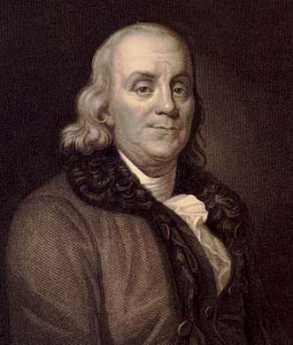
|
| Benjamin Franklin |
Benjamin Franklin's formal education ended with the second grade, but he must now be acknowledged as one of the most erudite men of his age. He liked to be called Doctor Franklin, although he had no medical training. He was given an honorary degree of Master of Arts by Harvard and Yale, and honorary doctorates by St.Andrew and Oxford. It is unfortunate that in our day, an honorary degree has degraded to something colleges give to wealthy alumni, or visiting politicians, or some celebrity who will fill the seats at an otherwise boring commencement ceremony. In Franklin's day, an honorary degree was awarded for significant achievements. It was far more prestigious than an earned degree, which merely signified adequate preparation for potential later achievement.
And then, there is another subtlety of academic jostling. Physicians generally want to be addressed as Doctor, as a way of emphasizing that theirs is the older of the two learned professions. A good many PhDs respond by rejecting the title, as a way of sniffing they have no need to be impostors. In England, moreover, surgeons deliberately renounce the title, for reasons they will have to explain themselves. Franklin turned this credential foolishness on its head. Having gone no further than the second grade, he invented bifocal glasses. He invented the rubber catheter. He founded the first hospital in the country, the Pennsylvania Hospital, and he donated the books for it to create the first medical library in the country. Until the Civil war, that particular library was the largest medical library in America. Franklin wrote extensively about gout, the causes of lead poisoning and the origins of the common cold. By inventing bar soap, it could be claimed he saved more lives from the infectious disease than antibiotics have. It would be hard to find anyone with either an M.D. degree or a Ph.D. degree, then or now, who displayed such impressive scientific medical credentials, without earning -- any credentials at all.
Franklin: Upstart Hero of King George's War (1747)
In 1747, Benjamin Franklin had a life-transforming experience, acting quite unlike his character before, or later. At that time, Old Europe was engaged in some distant tribal skirmishing which has come to be known as King George's War. King George II, that is, under whose rule Franklin in 1751 inscribed on the cornerstone of the Pennsylvania Hospital that Pennsylvania was flourishing, "for he sought the happiness of his people."
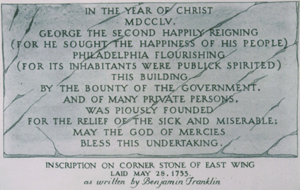
|
|
The cornerstone of the Pennsylvania Hospital inscribed by Franklin. |
Those distant commotions suddenly developed a harsh reality for the little pacifist sanctuaries on the Delaware River, when French and Spanish privateers suddenly raided and destroyed settlements on Delaware Bay. The Quaker Assemblies and their absentee Proprietor merely dithered and huddled in the face of what impended as a totally unexpected threat of annihilation of the pacifist colonies. It probably only seemed natural for the owner of the largest newspaper in the colony to publish a pamphlet called "Plain Truth," urging the inhabitants to rally to their own defense, and pressure their government to lead them. The Quaker leaders were in fact unable to readjust a lifetime of pacifist belief in a few days of an emergency, and the English Proprietor, then Thomas Penn, was far too remote to take active charge of matters. So, Franklin gave speeches, also an unfamiliar role for him, and finally brought out a detailed proposal for the creation of a Pennsylvania Militia. Ten thousand volunteers promptly signed up, elected Franklin as their Colonel; but he declined, and served as a common soldier.
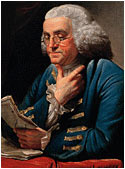
|
| Benjamin Franklin in 1767. |
Against naval attack, the Militia needed cannon, which did not exist in the colony. So Franklin organized a lottery, raised three thousand pounds, and tried to buy cannon from Governor Clinton of New York. New York declined to sell, and so Franklin led a delegation to New York to negotiate. The negotiations largely consisted of getting Governor Clinton drunk and convivial, but they were successful, the artillery was shipped off to Philadelphia. Although they were undoubtedly grateful to Franklin for saving the day, this entirely extra-legal recruitment of an army badly rattled the Quakers and their Proprietor, since it demonstrated the ineffectiveness of their governance at a time of obvious crisis, and might ultimately have led to their overthrow. Franklin's heroic behavior seemed so threatening to Thomas Penn that he described him as "a dangerous man," acting like "the Tribune of the People."
When the underlying commotion in Old Europe subsided, the threat to the colonies disappeared, so the Militia disbanded in a year. Franklin seemed to be just as uncomfortable with his unaccustomed role as the governing leaders were, and he hardly ever mentioned it again. However, this is the sort of reflex leadership which makes political careers, and it surely influenced his decision to retire from business in 1748, run for election to the Assembly, and live like a gentleman. Seven years later, during the French and Indian War, he had become the chosen leader of the Pennsylvania Assembly, had much longer to think through what he was doing, and had learned how to organize a war. By that time, as the saying goes, he knew who he was. He was a man whose silent memories could flashback to that time when a bald fat printer stepped out of the crowd, saying "Follow me," and ten thousand men with muskets did so.
Litchfield County, Extended (1771-1775)
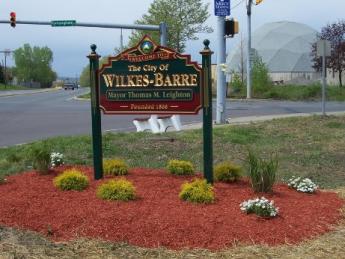
|
| Wilkes-Barre |
FOR four years, the Connecticut settlers considered the apparently peaceful Wyoming Valley of Pennsylvania to be part of Litchfield County, Connecticut, and its main little town was called Westmoreland (now Wilkes-Barre, although it still has a Westmoreland Club). However, the high-living, non-Quaker sons of William Penn were ill content to let matters remain that way. Their response was to sell large tracts of land in the area, on condition the purchasers would do whatever fighting was needed to conquer and hold it. The main purchasers were Scotch-Irish from Lancaster County, and the main speculators were prominent Philadelphians with names like Francis, Tilghman, Shippen, Allen, Morris, and Biddle. This speculative land sale was to be the source of trouble for decades because it conflicted with titles to the same land issued by the Susquehanna Company.
The predictable trouble surfaced in 1775, with the Second Pennamite War. Under the command of a man named >Plunkett, 700 Pennsylvania soldiers marched to liberate Wyoming and were soundly defeated by the Connecticut soldiery under the command of Zebulon Butler. There might have been further fighting in this expanded war, except for the other eleven colonies applying great pressure on these two colonies fighting each other with potential jeopardy to the united rebellion against British rule. While the Penn family were definitely royalist in their sympathies, their colonial property put them in an awkward position with their Scotch-Irish allies, who were, in all colonies, the main leaders in the revolution. The effect was to isolate the Connecticut invaders, even though they were the victors in the fighting.
Franklin's Public Pledge to Braddock
Ihappened to say I thought it was a pity they had not been landed rather in Pennsylvania, as in that country almost every farmer had his wagon. The general eagerly laid hold of my words, and said, "Then you, sir, who is a man of interest there, can probably procure them for us; and I beg you will undertake it." I asked what terms were to be offered the owners of the wagons, and I was desired to put on paper the terms that appeared to be necessary. This I did, and they were agreed to, and a commission and instructions accordingly prepared immediately. What those terms were will appear in the advertisement I published as soon as I arrived at Lancaster, which being, from the great and sudden effect it produc'd, a piece of some curiosity, I shall insert it at length, as follows:
"ADVERTISEMENT. "LANCASTER, April 26, 1755.

|
| Benjamin Franklin |
"Whereas, one hundred and fifty wagons, with four horses to each wagon, and fifteen hundred saddle or pack horses, are wanted for the service of his majesty's forces now about to rendezvous at Will's Creek, and his excellency General Braddock having been pleased to empower me to contract for the hire of the same, I hereby give notice that I shall attend for that purpose at Lancaster from this day to next Wednesday evening, and at York from next Thursday morning till Friday evening, where I shall be ready to agree for wagons and teams, or single horses, on the following terms, viz.: I. That there shall be paid for each wagon, with four good horses and a driver, fifteen shillings per diem; and for each able horse with a pack-saddle, or other saddle and furniture, two shillings per diem; and for each able horse without a saddle, eighteen pence per diem. 2. That the pay commences from the time of their joining the forces at Will's Creek, which must be on or before the 20th of May ensuing, and that a reasonable allowance is paid over and above for the time necessary for their traveling to Will's Creek and home again after their discharge. 3. Each wagon and team, and every saddle or pack horse is to be valued by indifferent persons chosen between me and the owner; and in case of the loss of any wagon, team, or other horse in the service, the price according to such valuation is to be allowed and paid. 4. Seven days' pay is to be advanced and paid in hand by me to the owner of each wagon and team, or horse, at the time of contracting, if required, and the remainder to be paid by General Braddock, or by the paymaster of the army, at the time of their discharge, or from time to time, as it shall be demanded. 5. No drivers of wagons, or persons taking care of the hired horses, are on any account to be called upon to do the duty of soldiers or be otherwise employed than in conducting or taking care of their carriages or horses. 6. All oats, Indian corn, or other forage that wagons or horses bring to the camp, more than is necessary for the subsistence of the horses, is to be taken for the use of the army, and a reasonable price paid for the same.
"Note.--My son, William Franklin, is empowered to enter into like contracts with any person in Cumberland county. "B. FRANKLIN."
-------------------------------------------
To the inhabitants of the Counties of Lancaster, York and Cumberland.
"Friends and Countrymen,
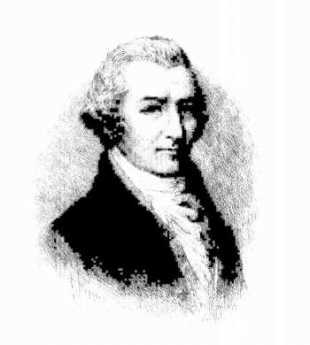
|
| General Braddock |
"Being occasionally at the camp at Frederic a few days since, I found the general and officers extremely exasperated on account of their not being supplied with horses and carriages, which had been expected from this province, as most able to furnish them; but, through the dissensions between our governor and Assembly, money had not been provided, nor any steps taken for that purpose.
"It was proposed to send an armed force immediately into these counties, to seize as many of the best carriages and horses as should be wanted, and compel as many persons into the service as would be necessary to drive and take care of them.
"I apprehended that the progress of British soldiers through these counties on such an occasion, especially considering the temper they are in, and their resentment against us, would be attended with many and great inconveniences to the inhabitants, and therefore more willingly took the trouble of trying first what might be done by fair and equitable means. The people of these back counties have lately complained to the Assembly that a sufficient currency was wanting; you have an opportunity of receiving and dividing among you a very considerable sum; for, if the service of this expedition should continue, as it is more than probable it will, for one hundred and twenty days, the hire of these wagons and horses will amount to upward of thirty thousand pounds, which will be paid you in silver and gold of the king's money.
"The service will be light and easy, for the army will scarcely march above twelve miles per day, and the waggons and baggage-horses, as they carry those things that are absolutely necessary to the welfare of the army, must march with the army, and no faster; and are, for the army's sake, always placed where they can be most secure, whether in a march or in a camp.
"If you are really, as I believe you are, good and loyal subjects to his majesty, you may now do a most acceptable service, and make it easy to yourselves; for three or four of such as can not separately spare from the business of their plantations a waggon and four horses and a driver, may do it together, one furnishing the wagon, another one or two horses, and another the driver, and divide the pay proportionately between you; but if you do not this service to your king and country voluntarily, when such good pay and reasonable terms are offered to you, your loyalty will be strongly suspected. The king's business must be done; so many brave troops, come so far for your defense, must not stand idle through your backwardness to do what may be reasonably expected from you; wagons and horses must be had; violent measures will probably be used, and you will be left to seek for a recompense where you can find it, and your case, perhaps, be little pitied or regarded.
"I have no particular interest in this affair, as, except the satisfaction of endeavoring to do good, I shall have only my labor for my pains. If this method of obtaining the wagons and horses is not likely to succeed, I am obliged to send word to the general in fourteen days; and I suppose Sir John St. Clair, the hussar, with a body of soldiers, will immediately enter the province for the purpose, which I shall be sorry to hear, because I am very sincerely and truly your friend and well-wisher, B. FRANKLIN."
-------------------------------------
Ireceived of the General about eight hundred pounds, to be disbursed in advance-money to the wagon owners, etc.; but, that sum being insufficient, I advanced upward of two hundred pounds more, and in two weeks the one hundred and fifty wagons, with two hundred and fifty-nine carrying horses, were on their march for the camp. The advertisement promised payment according to the valuation, in case any wagon or horse should be lost. The owners, however, alleging they did not know General Braddock, or what dependence might be had on his promise, insisted on my bond for the performance, which I accordingly gave them.
--Chapter XVI, The Autobiography of Benjamin Franklin
Pirate Lair
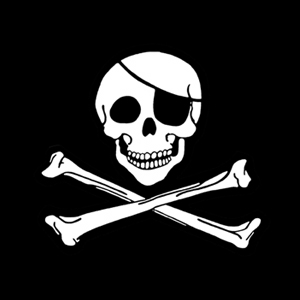
|
| Jolly Roger Flag |
Delaware takes a ninety-degree turn right at about the place where the Salem nuclear cooling towers are visible on the Jersey shore, and great quantities of silt have piled up in the river there, making marshes and swamps. There is a rumor that Captain Kidd tied up among these marshy islands, and much better evidence that Blackbeard the Pirate used the Delaware marshes as a hideout. Since a high-speed highway, with limited access, now rushes visitors to the slot machines of Dover and the beaches of Lewes, no one much notices that this area hasn't changed much from what it probably looked like three hundred years ago.
But if you take the old road, Delaware Route 9, you wander through the backcountry and are only likely to meet duck hunters. At one point, with a lake to one side and the river on the other, a watchtower has been erected for bird watchers and the like. It's very beautiful there, and quiet.
So one day I drove up, parked my car at the base of the tower, and climbed a hundred steps to the top. Blackbeard was not in evidence, but it was easy to see how he might feel pretty secluded in the coves and behind the trees. There were lots and lots of birds, interesting enough but mostly unidentifiable by me. Like most big-city lovers of the environment, I mostly classify birds as little brown jobs (LBJ) and big black buggers (BBB). And then a car drove up, with some chattering teenagers.
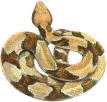
|
| Copperhead |
From a hundred feet up, it was hard to tell what they were saying, and it probably didn't matter much. Until suddenly one of the girls screeched out, "Oh look! There's a big snake under that man's car! "
One of the boys in the car shouted out, "That's a copperhead snake! I've never seen one so big!"
And so, they roared off into the distance, leaving the marshy paradise to me and the snake. What do I do now?
I waited, hoping the snake would go away. But it started to get dark, and now it was even more unattractive to chase around with snakes. So, creeping to the bottom of the stairs, I made a dash for the car door, jumped in, and slammed it tight.
As I drove away, I could not see any snake on the ground under the place where I had parked. To this day, I don't know if there really was a snake there or not.
Charles Peterson and Amity Buttons
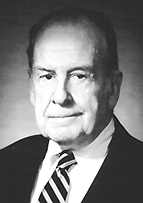
|
| Charles Peterson |
Charles Peterson, the famous architectural historian and preservationist, died just before his 98th birthday on August 19, 2004. It is to him we largely owe the redevelopment of Society Hill, and the design of the Independence National Park, as well as a host of restorations from the Adams Mansion of Quincy, Massachusetts, to the early French settlements along the Mississippi. He conceived of many national historic preservation projects, the most notable of which is the Historic American Buildings Survey (HASB) of the Department of the Interior.
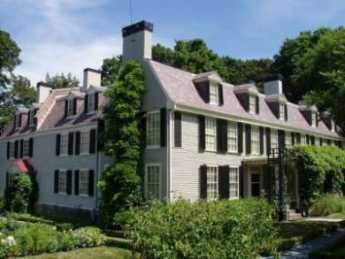
|
| The Adams Mansion |
While he was most notable for large visions and huge projects, he also had a keen appreciation for fastidious accuracy in small matters, of which the Amity Button would be a vivid example. In the surviving Colonial buildings of Philadelphia, it is common to find a plain ivory coat button nailed to the top of the newel post of the main staircase. There's one in Independence Hall, another in the grand staircase of the Pennsylvania Hospital, and there is one in Charlie Peterson's own home, the one where he was the first Society Hill gentrification pioneer, a house originally built by Stephen Girard around 3rd and Spruce.
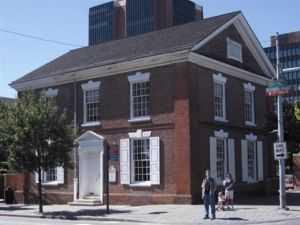
|
|
The Free Quaker Meeting House |
There is a strong tradition in Philadelphia that these strange buttons are Amity Buttons, nailed there by the Quaker builder at the moment when the new owner had fully settled his construction debt, symbolizing the amity between a willing buyer and a willing seller. Countless visitors to Society Hill have been shown these curious buttons, and it always seems to produce a warm glow of appreciation for the discovery. If you have one of these in your own house, you can be very proud.
Unfortunately, Charlie Peterson couldn't find any evidence for the truth of this fable, and you can be sure he subjected the matter to a totally dedicated search. You might think there would be some notations in the deeds, or in the correspondence of the day, or in the literature of the times. You would think that someone who repeats this tale would be able to relate where he got it, and that would lead to some letters in an attic, and that if you work hard enough, you will find it. But when the button matter came up, Mr. Peterson would suddenly become grim-lipped and sad, and repeat the mantra that there is no evidence to support the story. He even awarded prizes to architectural students for essays on newel posts, banisters, and stair rails, but no student essay ever turned up any authentication of the Amity Button story. Absence of evidence is of course not the same as evidence of absence, so it is remotely possible that the story will someday be vindicated.
Indeed, you have to believe there was something or other to start the story. Victor Failmetzger and his wife, who have a notable reputation for authenticating old house parts, relate that in Colonial Virginia it was common to have hollow newel posts on the stairway, and occasionally to find the deed to the house secreted in one of them. So the search goes on.
In fact, it always seemed likely that Charles Peterson very much wanted to believe the fable was true. But until some evidence turned up, he was going to go to his grave with the declaration that there existed no evidence for it.
7 Blogs
THE ENGLISH SETTLEMENTS 1619-1776 (Vol 189)
 At first, Europe rushed to settle the new world. King Henry the VIII started it for England, and his daughter Elizabeth pushed it along by piracy and other aggressive methods to steal it away from Spain and the Pope. By 1750 the adjustment between the home country and its colonist empire was coming to a confrontation. On a geographic level it was two cultures separated by 3000 miles of ocean. On an economic level it was Mercantilism versus the Frontier. But politicians dominated the scene of owners versus debtors, aristocrats versus vassals, owners versus slaves. Hardly anyone recognized that the Industrial Revolution was starting to sort things out.
The English Settlements
At first, Europe rushed to settle the new world. King Henry the VIII started it for England, and his daughter Elizabeth pushed it along by piracy and other aggressive methods to steal it away from Spain and the Pope. By 1750 the adjustment between the home country and its colonist empire was coming to a confrontation. On a geographic level it was two cultures separated by 3000 miles of ocean. On an economic level it was Mercantilism versus the Frontier. But politicians dominated the scene of owners versus debtors, aristocrats versus vassals, owners versus slaves. Hardly anyone recognized that the Industrial Revolution was starting to sort things out.
The English Settlements
A Toast to Doctor Franklin
 The Franklin Inn annually toasts three doctors. Even though Ben never went past second grade, his medical contributions are the most illustrious of the three. One of the most remarkable men who ever lived.
The Franklin Inn annually toasts three doctors. Even though Ben never went past second grade, his medical contributions are the most illustrious of the three. One of the most remarkable men who ever lived.
Franklin: Upstart Hero of King George's War (1747)
 'King George's War' was two wars prior to the Revolution. Ben Franklin raised an army when the Quaker proprietors' wouldn't. The experience maybe gave him ideas.
'King George's War' was two wars prior to the Revolution. Ben Franklin raised an army when the Quaker proprietors' wouldn't. The experience maybe gave him ideas.
Litchfield County, Extended (1771-1775)
 Connecticut won the Second Pennamite War, occupying Pennsylvania territory for four years. The American Revolution caused the other colonies to put a stop to the fighting.
Connecticut won the Second Pennamite War, occupying Pennsylvania territory for four years. The American Revolution caused the other colonies to put a stop to the fighting.
Franklin's Public Pledge to Braddock
 The pacifist Quaker legislature was paralyzed with indecision when General Braddock brought troops from England to defend the western frontier, but lacked horses and wagons. Franklin risked debtors prison by personally pledging to repay local farmers whose wagons were soon lost at Fort Duquesne.
The pacifist Quaker legislature was paralyzed with indecision when General Braddock brought troops from England to defend the western frontier, but lacked horses and wagons. Franklin risked debtors prison by personally pledging to repay local farmers whose wagons were soon lost at Fort Duquesne.
Pirate Lair
 Did Blackbeard use the Delaware marshes as a hideout?
Did Blackbeard use the Delaware marshes as a hideout?
Charles Peterson and Amity Buttons
 Most of our really historic buildings have an ivory button nailed to the newel post, and there is the only word of mouth to explain why. America's most famous preservation architect tried very hard to document some proof but couldn't.
Most of our really historic buildings have an ivory button nailed to the newel post, and there is the only word of mouth to explain why. America's most famous preservation architect tried very hard to document some proof but couldn't.